Kat Swanepoel

Catherine "Kat" Swanepoel (born 5 August 1987) is a South African Paralympic swimmer who competes at international swimming competitions, she is a double World champion. She competed at the 2020 Summer Paralympics.
Swanepoel was also a former wheelchair basketball and wheelchair rugby player before switching to swimming.
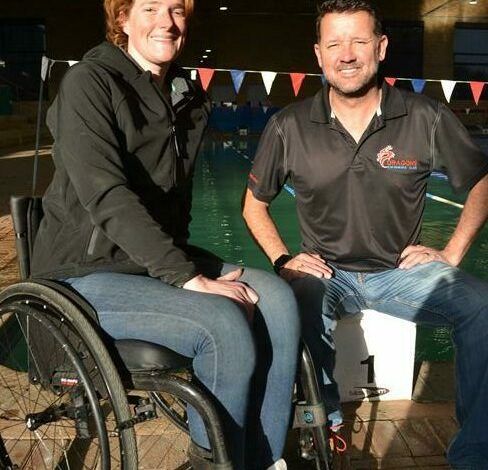
Paralympic swimmer Catherine Swanepoel with coach Theo Verster
Kat Swanepoel: Always Rising
2021
When Kat Swanepoel speaks about life-changing events she refers to them as “bumps in the road” or “bad luck”. She chronicles the effects of degenerative multiple sclerosis and then punctuates it with a positive. Sometimes the English language doesn’t have enough words to describe things adequately. The word “inspirational”, while relevant, is too soft.
This is a story of an incredible young woman with an indomitable spirit who played hockey and squash until she was 21 and is now representing South Africa at the Tokyo Paralympics at the age of 34. But it’s the last 13 years that are jaw-dropping.
They have resulted in her being diagnosed with a degenerative form of multiple sclerosis, consigned to a wheelchair two years later, representing her country at (wheelchair) rugby and basketball, going blind in one eye, having her body get progressively weaker to where she now has no sensation or movement from her chest down, or in half of her arms, to discovering swimming which has saved her life and given her renewed purpose.
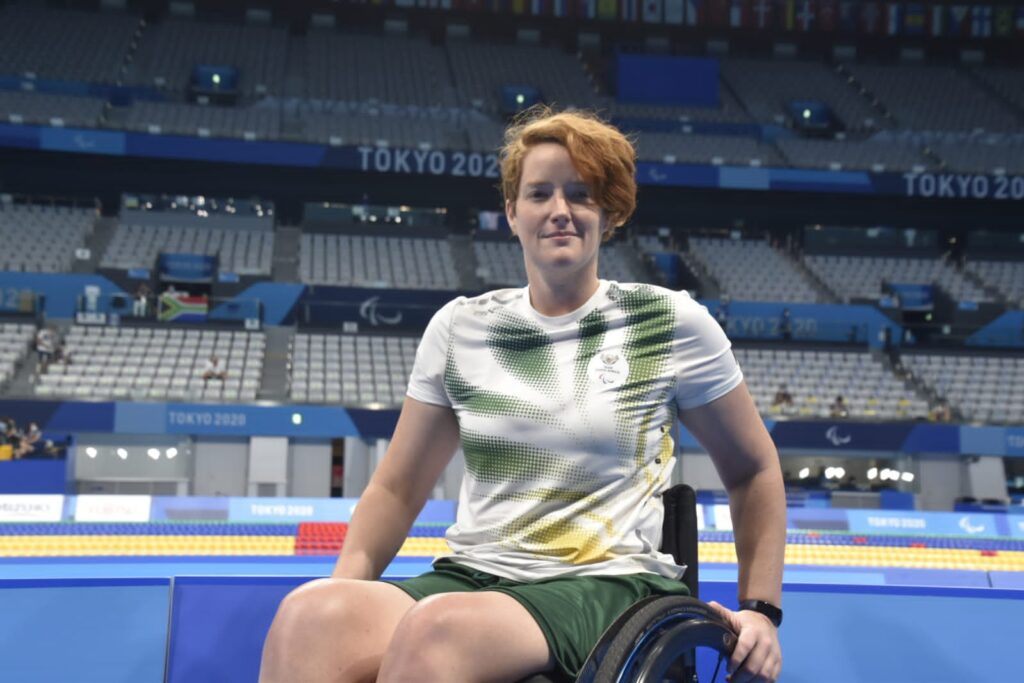
In the last few months alone, getting Covid was “another bump in the road”. She overcame that and has now competed at the Paralympics.
In the 150m Individual Medley, only the third time she has raced the event, she sliced nine seconds off her qualifying time.
Superwoman
Swanepoel refers to the fact she’s in Tokyo as a “miracle”. When you listen to her you will understand why. Superwoman is in the house.
“I’ve got a degenerative form of multiple sclerosis. Mine is the progressive one, a much quicker one. I was in my fourth year studying occupational therapy in 2008,” Swanepoel says.
“I started to feel weakness and pins and needles, and the doctors thought I’d damaged a disc in my back. Eventually,” and she stretches out the word, giving you an indication of the process, “they gave me a full diagnosis.
“I started using a wheelchair in 2010 (aged 23). I’d like to say I handled the change with grace, but I became a bit of a hermit and am still grateful that one of my occupational therapist friends said, ‘you know Kat, you can sit at home and be miserable, but eventually fewer and fewer people will come to see you. Or, you can go out and live life. Nothing is going to change your physical disability, but you can change your quality of life.’”
Swanepoel had always been active and enjoyed sport, although gravitated towards team sports. In the prime of her physical life she touched 6ft in height and was a match for any opponent on the squash court or hockey field.
She also thrived in contact situations, although a first broken nose while playing squash was “an accident”. A second broken nose, this time playing wheelchair basketball, a couple of years later was “a rookie error. Note, never hold your hands in front of your face when catching the ball.”
But, being healthy and active at 21 and then being diagnosed with MS and being confined to a wheelchair at the age of 23 would test the resolve of even the most resilient person.
She had two options: “sit at home feeling miserable for yourself or live life”. She chose the latter.
“For me, the day-night change was when I went to my first wheelchair basketball practice,” she says. “All of a sudden, instead of being the only one with a disability, I was in an environment where disability was the norm.
“There you’ve got the Leons of this world (current TeamSA chef de mission Leon Fleiser) laughing at you when you fall over, and also people know behind the scenes stuff. It makes a big difference.
“I was still working at Weskoppies psychiatric hospital, so I started (wheelchair) basketball with a Pretoria team and moved to Joburg and started with the Eagles in Mandeville.
“When I started playing wheelchair basketball my paralysis was mainly from the hips down. I had good upper body and hand strength. Then, I began to realise that I was losing strength in my arms and also in my core.”
While playing basketball she earned her South African colours, which was to be the first of three sports in which she has represented her country in these last 13 years. “It could have been four,” she adds, pointing out that she broke three national athletics track records over the sprints and 800. “I also did one marathon and a few 32km races.”
While playing basketball, she was introduced to wheelchair rugby. “I was at the Tuks sports arena and the Tuks rugby guys were training. The one guy looked at my hand and said, ‘do you know you’d be eligible to play rugby?’.
“So that’s where I started playing with them. For quite a while I played basketball and rugby which was always interesting to switch between the two roles.”
She shifts in her chair, the first indication something even bigger is coming.
“The night I was receiving my South African colours for wheelchair rugby I got my retinas detached in both my eyes,” Swanepoel says matter-of-factly.
“It was just bad luck. I had been having issues with my eyes which were linked to MS. At the event, I started seeing flashing lights and realised there was something wrong with my eyes. Initially, I thought I was having just another flare-up because if I’m under extreme stress, or am sick, it tends to speed up the progression of the illness.
“Often one of the first signs of degeneration is my vision. I went to the ophthalmologist, who found both retinas detached. Luckily they lasered the right eye back, but on the left eye I had surgery and stitches, but there were complications. At one stage we thought I’d lose my eye completely, not just go blind.
“I push myself into a lot of different things to escape from reality. If there’s a road bump, get over it. Being well into my 20s, my work helped me put things into perspective — ‘I’ve lost vision in my eye, but I’ve got another eye’.
“I stopped playing rugby before I stopped playing basketball because I was just taking too many knocks, too many hits. I’ve got an ‘uncerebral’ neck and although I’ve broken my leg playing basketball, with rugby you come off the court and you’ve got welts all over you.
“The physicality took a bit of a toll and I was told that with my condition and neck it wouldn’t be safe to continue with.
“So, in 2014 (age 27), I stopped rugby and focused on basketball. I kept going with the national team until the 2016 Rio Paralympic qualifiers. I was the only quad playing basketball, and the qualifiers were in Algeria.
“There I ended up having quite a few seizures after the last match and spent three days in ICU. It made me thankful for the standard of the hospitals in South Africa.” But now her basketball days are over as well.
She bought a “basic” chair to keep fit, but Swanepoel dedicated herself to her job. It’s not overly dramatic to say that while swimming has helped her get physically stronger, without her job her mental strength wouldn’t have allowed her to get over the “bumps” that have been placed ahead of her in life’s road. She was only encouraged to take up swimming in late 2019, just before the Covid-19 lockdown in March 2020.
Now, every weekday she leaves the house at 6.45am, when she’s off to work as a full time occupational health therapist. “A huge portion of my work is with kids with disabilities and I specialise in wheelchair seating and set up.
“It’s quite a physical job and it’s non-stop. I get home about 5.30 in the afternoon, have a cup of coffee and then it’s to the pool to train. I get home at 8.30-9pm and then it’s the admin and the adult stuff that needs to be done.”
Swanepoel drives an adapted automatic Honda. “It’s my soccer mom’s car as I do deliveries everywhere. I’ve got a lever on the right side where basically if I pull it, it links to the accelerator and if you push it there’s something that goes into your brakes. My right-hand side is stronger than my left.
“With my left hand there’s a cuff that I put my hand into and it rotates a spinner onto the steering wheel. I don’t have to change my grip to turn. Whenever I’m a designated driver I tease my friends that they must really trust me if they’re getting into a car driven by a blind cripple to get around!”
The obvious question is why does she push herself through 15-hour days, given she’s got such a precarious diagnosis?
“If not, then what’s the purpose?” she shoots back. “I think it’s the hard lockdown that taught me, you have to have purpose in your life. You have to have reason to get up and go.
“I think it’s also being involved in a career where you’re enriching someone else’s life. Every single day, if I’m having a bad day or I notice my condition has got worse … I work with people who would give anything to have what I have. I’ve got a home to go back to. I’ve got a degree. I’ve got a car.
“I travel to work between Benoni and Roodepoort and I work in a lot of rural areas and informal settlements. Although some of my clients have less serious physical disability, many have not had the rehabilitation or are as independent as I am.
“And in a lot of cases, they’re in a different socio-economic environment where you just count your blessings with what you have.
“Here in Tokyo, I was having a low day before my competition and the pressure was getting to me a bit and I replayed a voice note they sent me before I left.
“The note said that I’m carrying all of them here with me and I’m representing them. I thought, ‘this isn’t pressure, this is privilege’. I’ve got opportunities which others would kill for.”
For the first time, Swanepoel’s voice begins to quiver. A pause and then she continues.
“Here at the Paralympics, when I saw that Afghanistan flag being brought into the opening ceremony I thought, ‘how I can sit here and feel pressure and be angered with the classification changes that were handed to me recently, when in Afghanistan a lady can’t leave home without wearing a burqa for fear of being killed?’
“So when I saw that Afghanistan were actually represented here, I thought ‘that’s the power of sport, the power of the global community. Who am I to complain about pressure?’”
Before going to Croatia in July for her para-swimming classification grading she had been diagnosed with Covid-19.
“Swimming has helped with my strengthening and it’s given me a new lease on life,” Swanepoel says. “Having a very unpredictable degenerative illness you can’t think too far ahead.
“You have to believe that tomorrow will look after itself. All you can do today is pitch up. I can look back three years ago when I was in hospital, getting family called in. My neck was so weak I couldn’t couldn’t keep it up without a brace. How could I ever have believed then that I’d be at the Paralympics? So no, I don’t think about the future.
“But, when I told Theo (coach Theo Verster) in June that I’d been diagnosed with Covid he went cold because he thought ‘that’s it, we say goodbye’.
“But it was incredible how my body has improved from swimming. If I got Covid a few years back it wouldn’t have been easy … swimming has brought physical, mental and social well-being to my life.”
In Croatia in July, Swanepoel was raised two classification classes from an S2 and SM2 classification to S4 and SM4, which puts her into a far stronger group of disabled swimmers. The S4 for instance allows some kicking with the legs, while the South African has no sensation or movement from her chest or in half of her arms.
“Thankfully in Port Elizabeth earlier this year I had managed to swim two qualification times in the now-new class. The different grading though was a massive shock, disappointing as I think it was overly harsh, and meant a change of events.”
Swanepoel calls it a “miracle” that she’s at the Paralympics. “Because of so many stumbling blocks, it took me a long time to believe I was here,” she adds.” And then the village. There are so many different things to take in. Due to my job — being an OT specialist — I was just checking out all the different disabilities and going into OT mode.
“Oh my word! It’s just a massive privilege to be here and on the second day in the pool, I thought, “wow, I’m in that same water that Tatjana (Schoenmaker) won gold and broke the world record in. I’m really here!”
When she gets home from Tokyo, she will add the agitos Paralympic emblem to the tattoo she has on her left shoulder. “I’m quite tattooed up … my first one was the ankle, then on my right lower arm I’ve got two bass clefs, as I played the bass guitar and violin. I’ve also got a ‘bit of a dare, spontaneous free-handed tattoo’.
“On my back is a phoenix. It says unbowed, unbent, unbroken forever and always rising … rise is a theme of mine. The agitos ‘emblem’ will become three more tail feathers to the phoenix’s tail.”
Swanepoel is determined to continue rising and soaring. And swimming has now become integral to that journey. “I swim for hope. It doesn’t matter what your circumstances are. If you feel you’re dead and buried it’s over … Not just in a sporting sense. If you can’t hold onto hope, you have nothing.”
Superwoman has spoken.

Swanepoel picks up GOLD in Manchester
August 3, 2023
The remarkable rise of Kat Swanepoel as a force in para swimming continued when she won a gold medal at the World Para Swimming Championships in Manchester.
The South African had also picked up Team SA’s first medal of the championships, a silver in the SB9 50m breaststroke, and taking to the water in the SM4 150m individual medley she upped it to gold.
Swanepoel was perfectly placed in lane four, with two swimmers on either side of her. She had gone into the final as the fastest qualifier (2min 55.54sec), but the hard work still had to be done.
She was always in control of the race, touching the wall at 50m in the lead in 50.79 and after 100m she had a four second advantage, turning in 1:06.87. Swanepoel then negotiated the final 50m to touch first in an African record 2:51.41.
In the aftermath of the win the celebrations were put on hold as the officials investigated whether Swanepoel had transgressed the rules with her turn from backstroke to breaststroke. Initially she was DQ’d but after an appeal and an extensive review of the race footage, the result was reinstated and South Africa had a gold medallist.
As the cherry on the top it was the fourth African record to fall at these championships, and Swanepoel’s third.
MEDALS SO FAR (2)
Gold
Kat Swanepoel (SM4 150m individual medley)
Silver
Kat Swanepoel (SB9 50m breaststroke)
AFRICAN RECORDS SO FAR (4)
Kat Swanepoel (SB9 50m breaststroke, 57.19)
Kat Swanepoel (S4 100m freestyle, 1:36.13)
Kat Swanepoel (SM4 150m individual medley, 2:51.41)
Alani Ferreira (S12 100m butterfly, 1:18.35)
https://www.teamsa.co.za/swanepoel-picks-up-gold-in-manchester/
Indomitable Paralympian Kat Swanepoel on course for Paris Paralympic Games
January 31, 2024
When you check the word ‘Indomitable’ in the dictionary, it means “Impossible to subdue, something that cannot be beaten.” People described as having indomitable spirits don’t need pep talks or protein shakes; their strength comes from within.
The adjective indomitable starts with the Latin prefix in, which means “not.” The second part of the word is also from the Latin word domitare, meaning “to tame.” So the word literally means “not able to be tamed.” Indomitable is often teamed with the words spirit or personality to describe someone with a can-do attitude.
And in all honesty, a photo of Kat Swanepoel should be next to the word. Her story is one of resilience and rising against all odds. Sadly, it has not been told enough and truthfully, every South African deserves to hear this story, and be inspired and learn how much of a strong people we are.
“By choosing to keep picking myself up and striving for great things, I not only honour the opportunities that I have been blessed with but also that my example might give someone else going through a hard time, the motivation to keep on rising.”
South African Para Athlete, Kat Swanepoel
Swanepoel, now a Paralympian, has risen like a phoenix time again when life tried to pull a fast one on her. At the age of 21, she was forced to stop playing Hockey and Squash, after being diagnosed with a progressive form of multiple sclerosis.
In 2010, at the age of 23, she was consigned to a wheelchair.
After struggling with these “earth-shattering” news, wise words from a friend motivated her to change her mindset, choose life or choose sitting at home feeling miserable for herself. She chose to rise, pursued Wheelchair Basketball and managed to get national colours in the sport. While playing Basketball, Swanepoel was introduced to Wheelchair Rugby.
“It’s tough to pinpoint exactly what motivates me to get up and keep on pushing, but a lot of it comes from realising how amazingly blessed that I am to be able to do what I do, and that that there are so many others in our country who face much harder challenges than I do but yet don’t have the “reward” that I do from competing.”
With basketball national colours in the bag and her rugby going well, her commitment to a positive outlook received another onslaught on the very night she received her SA colours for wheelchair rugby: Swanepoel underwent a procedure to have her retinas detached in both eyes, almost losing her eye at one stage. Once again, life challenging her resolve.
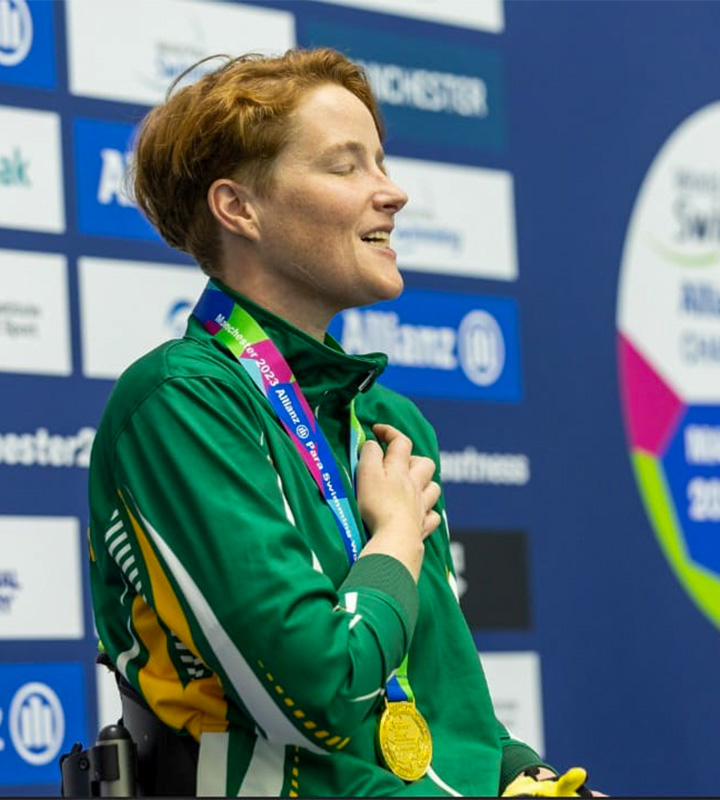
But true to her spirit and “never say die” attitude, she took up swimming in 2019. Fast forward to today, and Swanepoel is one of South Africa’s most formidable para-swimmers.
Within a short space of time she qualified for the Tokyo Paralympics in the 50-metre S4 Backstroke, just missing out on a bronze medal in her first major swimming competition by a slim half a second.
As she worked on becoming one of Mzansi’s finest swimmers, she won a gold medal at the World Para Swimming Championships in Manchester, a feat she treasures as one of her highlights.
“The biggest highlight of my sporting career has definitely been watching our flag being raised in Manchester, and singing our anthem. I had to hold back some very big tears.”
Swanepoel had also picked up Team SA’s first medal of the championships, a silver in the SB9 50m breaststroke, and taking to the water in the SM4 150m individual medley, she upped it to gold.
“World Champs in 2023 far outweighed my expectations, with two gold medals and a silver, as well as four personal best times out of five events. Not only did it give me confidence in the pool, but total trust in the process that me and my coach are in.”
After retiring from wheelchair basketball and rugby, Swanepoel took up occupational therapy, specialising in wheelchair seating and positioning. She assists clients of all ages and disabilities, and her work takes her from special needs schools to rehabilitation centres and clients’ homes.
She describes a day in her life: “The days are already hectic. I’m out of the house at 6h45 every morning, and commute about an hour to work. Work is fairly non-stop, due to patient load, and I finish at 3pm. I go to training immediately afterwards, and eventually get home most evenings at around 19h00.”
“Then I need to prepare supper and do all the “adulting” things that need to be done. The weekends are also quite packed with training or racing on Saturdays so having a day off on Sundays is very welcome. It’s a crazy, busy schedule, but I am super fortunate to do work that I love, as well as participate in the sport that I have grown to love so much.”
Now Paris awaits as she aims to book a ticket to the Paralympic Games, another opportunity to raise the South African flag and make the nation, her family and friends and herself proud.
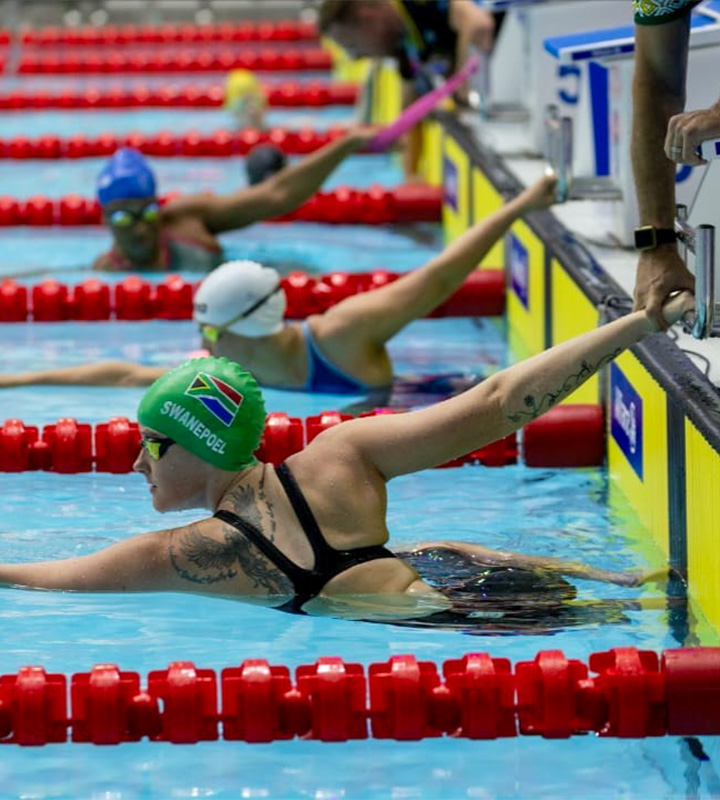
But what will it take for her to get to France?
“Para-swimming qualification for Paris 2024 is quite different than with able-bodied swimming. Each country is awarded a certain number of male and female participation slots, according to our performance at World Champs. Team selection is made closer to the Games, according to how many slots were awarded, how many qualified swimmers, and what your current world rankings are.
“In terms of qualification standards, I have swum qualifying times in four events for Paris 2024, so am eligible to participate, but all will depend on team selection. The system certainly keeps you pushing all the way. Even though I have achieved the qualifying times, I will still be doing quite a bit of local and international racing to hone my racing skills and as a measure to see where I am in terms of preparation.
“First goal for Paris is to get there and to be as fit and healthy as possible. And then my goal is to be as fast as I can possibly be, and to do SA proud.”
Asked what quote keeps her going when times get tough, Swanepoel chose: “But still, like dust, I’ll rise.” from Maya Angelou.
Challenges still come and go but still – she rises. “I had a set back at the end of last year when I tore my rotator cuff and was out of training for a period of time but the time out of the water just made me more appreciative of being able to swim and more hungry for the hard work ahead.
“Right now I’m in a great space with my swimming mostly because I just love what I do and that makes all the hard work worth it.”
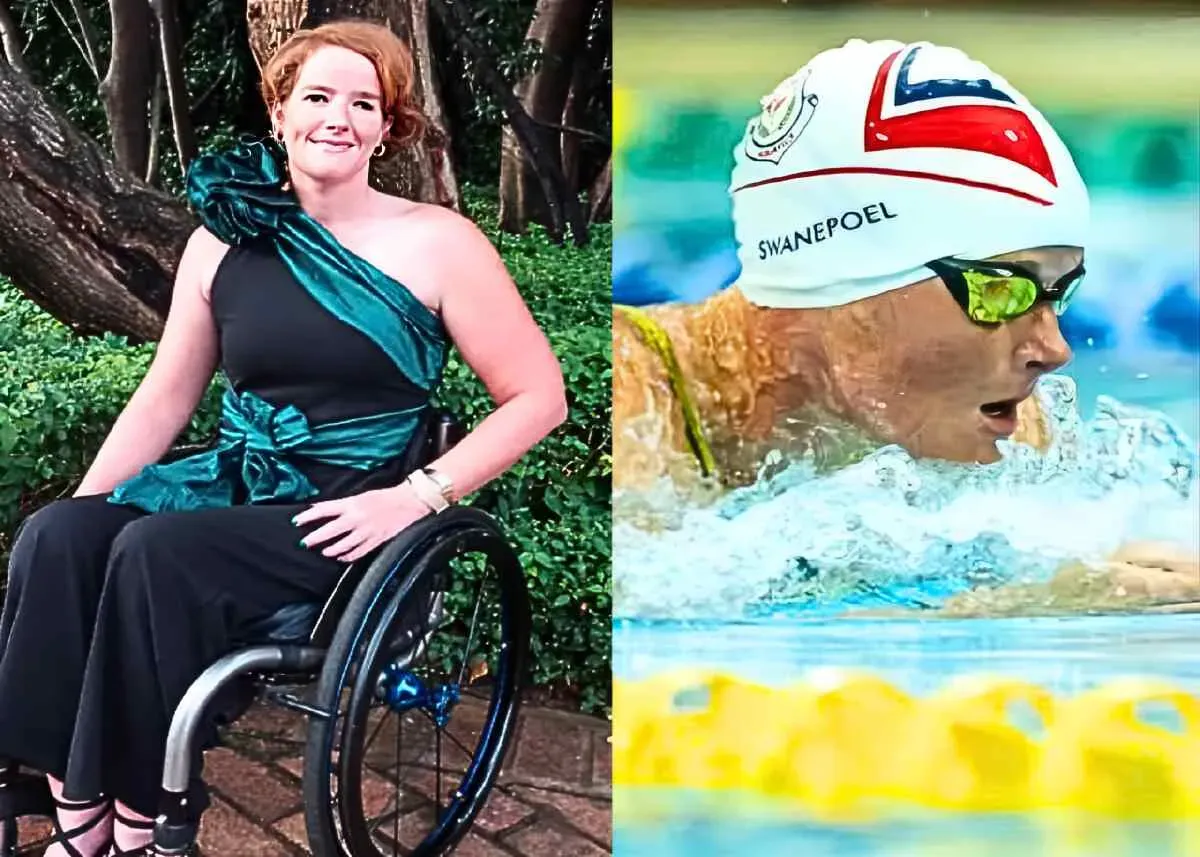
PARALYMPICS 2024: Swimmer Kat Swanepoel on having her world flipped upside down, and flying Team SA's flag high
26 August 2024
Swanepoel told EWN she was abruptly reclassified to swim against people with more physical function than she has, forcing her to learn a new stroke, and rethink her entire strategy.
“So Paris is not going to be my first Paralympics. I was fortunate enough that I took part in the Tokyo Paralympics, the 2020 COVID Paralympics. So it's certainly really great, you know, such a privilege going to your second Paralympics” said Swanepoel.
The swimmer reflects on the privilege of participating in her second Paralympics, and the new experiences that come with it.
“It's still new. It's still something different, but at least having the experience of a previous Paralympics, knowing a little bit what to expect.”
Looking back at her previous Games, Swanepoel highlights the importance of team support, especially during the Tokyo Paralympics when no spectators were allowed.
“There were no families allowed, no friends, no spectators. You depend on your team. We are family, and a lot of that team has stayed the same now going into Paris, so it's nice to know we've all travelled together. We consider each other brothers and sisters. So even though now we can have our families going over with us, we still have family together in swimming.”
Swanepoel tells Eyewitness News she goes into the Paris Games with a new classification, meaning she has had to quickly adapt to new qualifying times and learn new strokes, such as butterfly for the individual medley.
“So my reclassification, it flipped our world. It did, and it was completely unexpected. I was only due for reclassification in 2027. We went over to European champs just for some racing practice, and I got told to report for reclassification immediately. And within half an hour, two people changed pretty much the outcomes of my games going into a stronger classification. It means that I'm now competing against people who have more physical function than I do.”
Swanepoel has a progressive degenerative form of multiple sclerosis that she acquired in her fourth year whilst studying occupational therapy in 2008.
“I have an auto-immune condition called Primary Progressive Multiple Sclerosis (PPMS), where my immune system attacks my central nervous system, causing paralysis, amongst other issues," explained Swanepoel.
Her disability has other underlying issues that aren’t as visible, such as being paralysed from the chest down, going blind in one eye, and having her body get progressively weaker, to where she now has no sensation or movement from her chest down, or half of her arms.
When fatigued, she also struggles with speech as parts of her brain, optic nerves and spinal cord can be affected by her disease. She has had a stroke, and seizures aren't uncommon.
Swanepoel is determined to continue to raise South Africa’s flag high at the Paralympics.
PARALYMPICS 2024: 'I'm not done yet,' says swimmer Swanepoel after Games withdrawal
The athlete finished 11th in the Women’s 50m backstroke, setting a new African record despite a dislocated shoulder.
5 September 2024
JOHANNESBURG - South African Para-swimmer Kat Swanepoel dislocated her shoulder during her 50m backstroke on Tuesday and it seems that her Paris journey has sadly ended.
"I'm just heartbroken to have to withdraw," said Swanepoel.
The Paris Paralympic Games flag bearer told Eyewitness News that she’d been advised not to compete further.
"Our medical team have advised that I don't compete further. The doctor relocated it at the pool twice and they've now immobilised it," said Swanepoel.
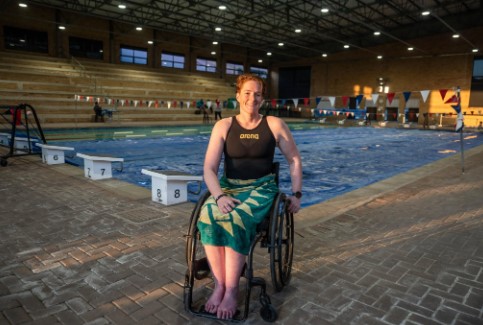
The athlete finished 11th in the Women’s 50m backstroke, setting a new African record despite a dislocated shoulder.
"It dislocated halfway through my race. I didn't feel the pain because of the adrenaline but lost all power. If you watch my race you can actually see it go and I end up on the lane rope on my right for the rest of the race."
She further told Eyewitness News that she was going to need some time to rest and recover but this wasn’t the end for her.
"I'm going to need some time for rest and recovery... will most likely need surgery on the shoulder but I'm certainly not done yet."
Swanepoel has a progressive degenerative form of multiple sclerosis that she acquired in her fourth year whilst studying occupational therapy in 2008.
"I have an auto-immune condition called Primary Progressive Multiple Sclerosis (PPMS), where my immune system attacks my central nervous system, causing paralysis, amongst other issues," explained Swanepoel.
Her disability has other underlying issues that aren’t as visible, such as being paralysed from the chest down, going blind in one eye, and having her body get progressively weaker, to where she now has no sensation or movement from her chest down or half of her arms.
When fatigued, she also struggles with speech as parts of her brain, optic nerves and spinal cord can be affected by her disease. She has had a stroke, and seizures aren't uncommon.